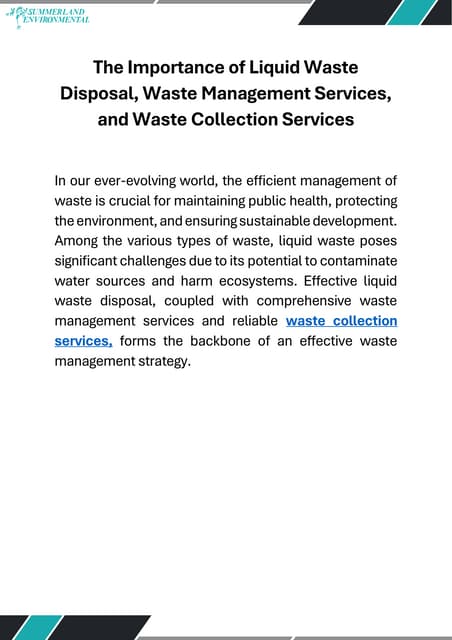Reclaim Waste Things To Know Before You Get This
Reclaim Waste Things To Know Before You Get This
Blog Article
How Reclaim Waste can Save You Time, Stress, and Money.
Table of ContentsWhat Does Reclaim Waste Mean?Reclaim Waste Things To Know Before You Get ThisSome Of Reclaim WasteSome Known Incorrect Statements About Reclaim Waste Rumored Buzz on Reclaim Waste
Discover the types, events, and types of fluid waste. Residential sewer waste describes the waste and items from a household septic system. This sort of waste is developed by people in homes, institutions, and other buildings. This only includes septic tanks that have a drain field. The correct administration and disposal of residential sewage waste need liquid waste to be moved to a sewage treatment plant where the appropriate approaches and equipment are applied to detoxify and throw away waste.
Business waste commonly consists of prospective threats, such as combustible materials or a combination of fluid and strong waste products, and needs an advanced and in-depth disposal process. The disposal of business waste commonly involves the filtering of waste before transportation to ensure risk-free and proper disposal. Hazardous waste is developed from results and runoff of commercial procedures and production.
This type of waste can not use the same sewage management transportation or processes as septic or business liquids. The commercial waste monitoring process requires the assessment and testing of fluid waste prior to it undergoes the disposal procedure (liquid waste disposal). Runoff waste is the liquid waste that originates from runoff and excess stormwater in extremely inhabited locations or cities
Drainage waste can cause contamination and flooding otherwise dealt with correctly. Discover more regarding sewer cleaning and waste monitoring. Guaranteeing proper waste monitoring can avoid calamities and decrease ecological harm. Both individuals in household settings and experts in industrial or production markets can take advantage of comprehending the processes and regulations of fluid waste administration.
Excitement About Reclaim Waste
Call PROS Providers today to discover our waste management and disposal solutions and the correct ways to look after the liquid waste you generate.
(https://moz.com/community/q/user/reclaimwaste1)This supposed 'wastewater' is not just an essential resource yet, after therapy, will certainly be launched to our land, waterways or the sea. Made use of water from bathrooms, showers, baths, kitchen area sinks, laundries and commercial procedures is known as wastewater.

water made use of to cool down equipment or clean plant and tools). Stormwater, a kind of wastewater, is runoff that website here streams from agricultural and metropolitan locations such as roofings, parks, yards, roads, courses and gutters into stormwater drains, after rain. Stormwater streams unattended directly to neighborhood creeks or rivers, eventually getting to the sea.
Getting The Reclaim Waste To Work
In Queensland, most wastewater is dealt with at sewage therapy plants. Wastewater is moved from residential or industrial sites through a system of sewers and pump terminals, referred to as sewage reticulation, to a sewage therapy plant. City governments develop, keep and run most sewer therapy plants. Operators are licensed under the Environmental Defense Act 1994 to release cured wastewater at an appropriate environmental standard into rivers.
The Department of Natural Resources encourages regional governments concerning handling, operating and keeping sewerage systems and treatment plants. In unsewered locations, city governments might require householders to set up private or household sewer therapy systems to deal with domestic wastewater from toilets, kitchens, washrooms and laundries. The Department of Natural Resources authorizes using household systems when they are proven to be effective.
Many stormwater obtains no therapy. In some brand-new subdivisions, treatment of some stormwater to eliminate trash, sand and gravel has started utilizing gross pollutant catches. Wastewater treatment happens in 4 stages: Gets rid of solid matter. Larger solids, such as plastics and other objects incorrectly discharged to drains, are eliminated when wastewater is travelled through displays.
Wastewater then flows right into huge storage tanks where solids work out and are removed as sludge. Oil and scum are skimmed from the surface. Makes use of tiny living microorganisms referred to as micro-organisms to break down and get rid of remaining dissolved wastes and great fragments. Micro-organisms and wastes are included in the sludge. Gets rid of nitrogen and phosphorus nutrients that might cause algal blossoms in our waterways and threaten aquatic life.
Some Known Incorrect Statements About Reclaim Waste
Nutrient elimination is not available in any way sewer treatment plants since it needs pricey specialised equipment. It is coming to be extra common in Queensland. Clear liquid effluent created after treatment might still consist of disease-causing micro-organisms. If this effluent is released into waterways such as rivers or the sea, the micro-organisms will at some point pass away out.

The majority of wastewater moves into the sewerage system. Under the Act, regional federal governments administer authorizations and licences for eco relevant tasks (Periods) involving wastewater launches that might have a regional effect.
Indicators on Reclaim Waste You Should Know
Otherwise, samples are considered laboratory analysis. Commonly numerous examinations are required to establish the levels of each of the various toxins such as oils, heavy steels and pesticides in water. Surveillance provides factual information about water top quality and can validate that licence conditions are being fulfilled. The info obtained with monitoring provides the basis for making water quality decisions.
Report this page